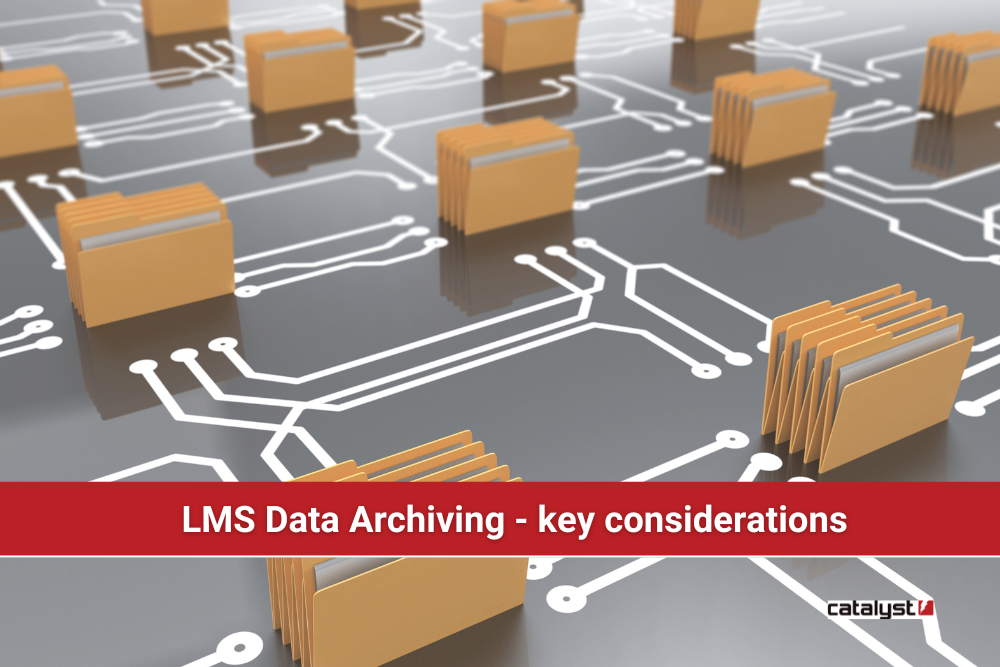LMS Data Archiving – key considerations.
LMS data archiving is about protecting what matters, removing what doesn’t, and keeping your system fast, compliant, and cost-effective. It’s not just a technical process — it’s a key part of good digital governance in education.
Effective LMS data archiving has many benefits. The top five that come to mind include:
- Optimising storage
- Improving your LMS performance
- Being legislatively compliant
- Reducing risk
- Reducing costs
For many secondary education providers, avoiding the situation of the ever-growing LMS footprint is unavoidable.
Moodle LMS, for example, is an advanced platform offering easy ways to share teaching materials, videos, and interactive learning content. It also provides all kinds of assessment tools and grading capabilities.
Over the years, Moodle has become the single source of truth for course content, assessments, results and reporting for many organisations – universities, colleges and enterprise level companies that rely on ongoing employee training. This means more and more data is being stored in Moodle platforms everywhere, including those of our clients.
The current trends of continuing education and flexible, part time study options, mean that many universities also have to deal with various user groups and store data over longer periods of time.
Regardless of the platform you are using, the larger your LMS footprint, the more difficult and costly it is to maintain. In addition, the software upgrade processes for very large LMS platforms become more cumbersome and may need longer outage periods.
One Catalyst client, CQUniversity (CQU), is a dual sector organisation – a university and a TAFE. In addition, they are known for being one of the most distributed and accessible education providers, servicing students of different needs, ages and geographic locations, including Australia’s remote areas.
“At CQU most of our students are mature entry students; people who have started a university degree later in life, study part time, and stay in the pipeline for 7-8 years,” says Pavle Jeric, Deputy Director for Online Systems and Future Proofing at CQU. “This is a challenge that’s probably quite unique to us.”
At MoodleMoot Australia 2024, Pavle had presented CQU’s workflows for Moodle archiving.
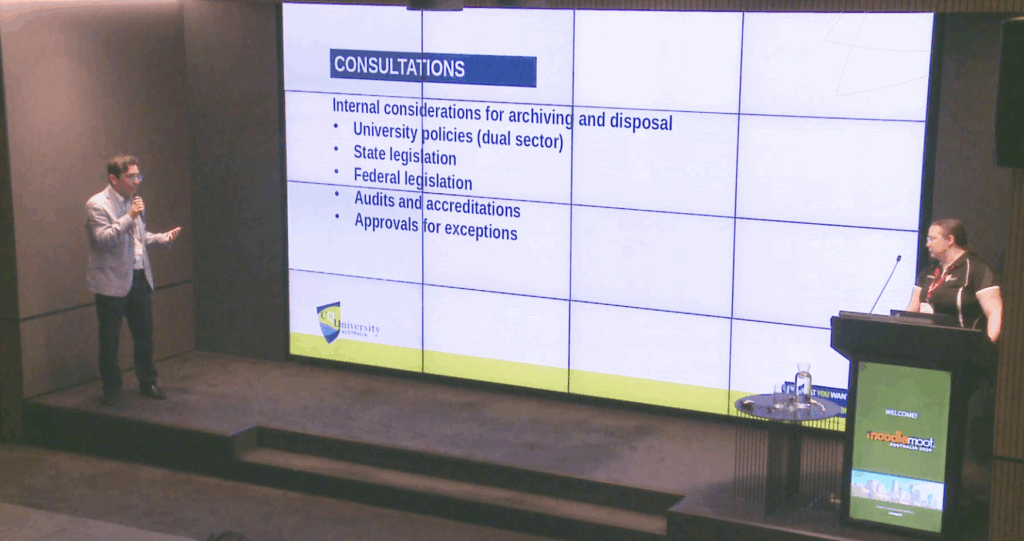
LMS Archiving Considerations
There are many things to consider when it comes to establishing an effective system for LMS archiving.
One is obviously understanding all the legislative policies – State and Federal. Then, there are internal consultations with all the key stakeholders that need to be held, to understand what kind of information has to be available at any given time, and for what reasons. Sector-wide external consultations with other universities (or similar organisations to yours), regardless of which LMS they use, are also worth having.
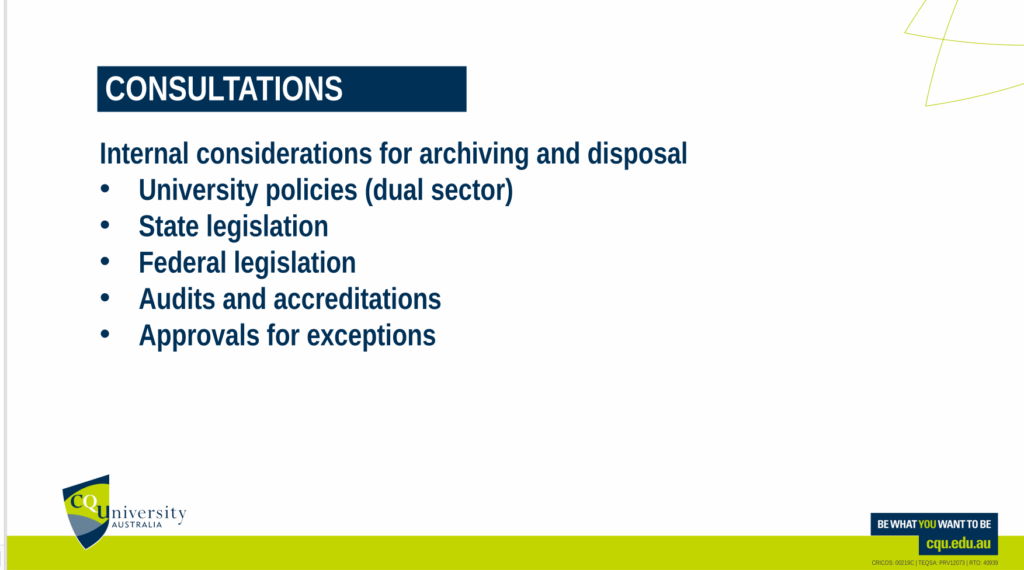
“And then, there are other things on top of that,” says Pavle, “that are not always documented.”
“A lot of the courses that we teach, have external accreditations. For example, if you have completed a Bachelor of Law, you probably have some sort of law society that’s accrediting your degree. Very often, those accreditation bodies would want to do an audit of your content, and look at things from x many years ago.”
“The policy around restoring files is another important decision to be made, i.e. at which level do we provide an approval for an academic request to restore certain files? At CQU, its a Deputy Dean of a School (or faculty).”
“We are the most ‘distributed university’, Australia’s true national university,” says Pavle, “because we exist in every state.”
“Our Moodle is so bloated, our outage periods are getting longer and longer when its time to upgrade. It is simply becoming unsustainable, the costs of maintaining that are quite high.”
“Archiving process for us starts at two years from the time when the grades are being released. Then, they are moved to a category of ‘academic access only’. Three years later, we check if there are any missing grades and whether all grades had been finalised. Then, we move them into ‘archiving category’”.
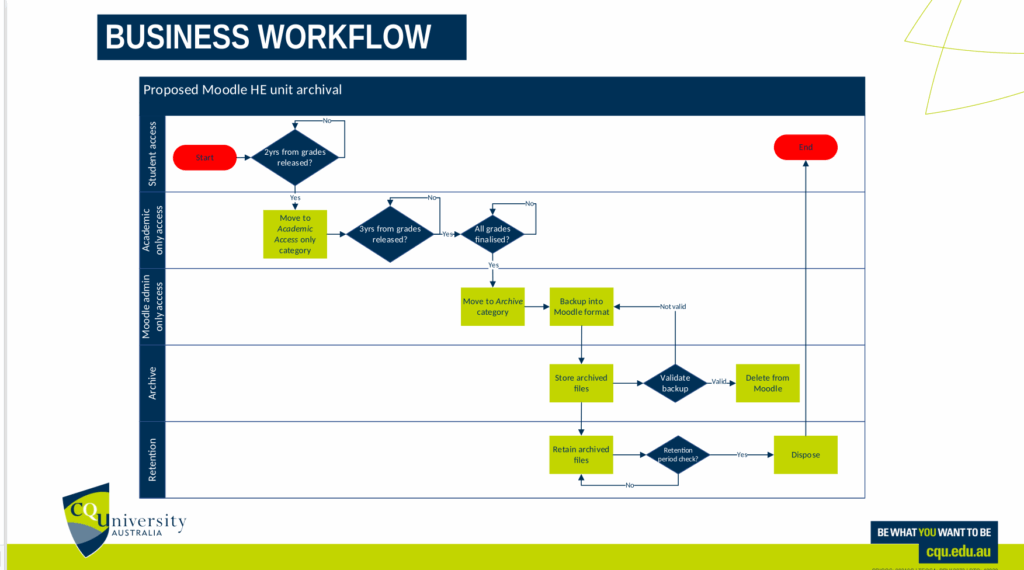
CQU have been working with Catalyst to improve and extend a number of plugins – such as ‘the Moodle tool_lifecycle plugin – to manage their archiving more sustainably and with less administrative burden and overhead; the high level approach is outlined in the below diagram.
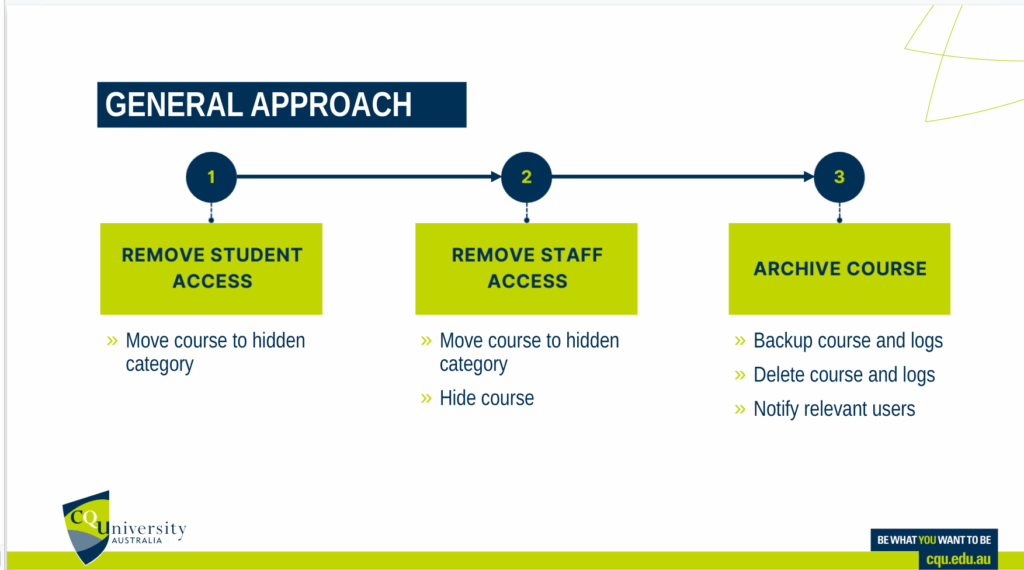
Eliminating some of the archiving challenges and achieving a smooth, automated archiving process is still work in progress for CQU. Ignoring, or even just delaying, the process would not make sense.
“We could probably get away with rolling out the archiving project for another year or so,” says Pavle. “but I encouraged my team to start sooner rather than later because eventually, we would still have to do this, why wait?”
No doubt, many large organisations and education providers can relate.
“Archiving the data and learning content that is housed in Moodle is something that we’ve been talking about more and more with our clients in recent years,” says Andrew Boag, Catalyst IT Australia’s CEO.
“Each year there is a cumulative increase in the amount of data being stored. This has cost implications, as well as potentially bashing up against retention rules and obligations.”
View Andrew’s presentation on Moodle Archiving from MoodleMoot Global 2023 below:
Archiving for future use – why and how.
One of the most important considerations in LMS archiving is ‘ease of access’ to archived data you may require at any point in time.
“It’s critical that if you remove (archive) data from Moodle, that this data is still discoverable and available,” says Andrew. “If you are choosing to archive due to necessity, then it needs to be usable.”
“Archiving is not new and there are many definitions of archiving but the one that I like most is ‘keeping things available for future use but with less storage and clutter’.”
“Organisational obligations are only growing and it’s important to remember that having a good archiving policy doesn’t mean you are legislatively compliant, and being legislatively compliant doesn’t mean you have a good archiving policy.”
Future use’ and what it means to your organisation is one of the top three considerations in archiving. “Think about your first digital camera, say it was from 2008 – can you easily access all the photos taken on that camera?” asks Andrew. “And who woke up one day and decided that they want to get rid of all the photos taken in 2008, because we simply don’t need them?”
This is a good way to think about archiving.
There will be digital assets that you pretty much would want to keep forever, and there are those that you won’t need. Understanding your obligations and having an effective system in place when it comes to information use, retention and deletion is key.
In addition to the most common reasons for effective LMS data archiving workflows – legislative obligations and cost management – do not underestimate other benefits to your organisation, including:
- Better LMS performance and user experience – fewer records in database tables to process, faster page loads, reporting and searches
- Improved reporting and analytics – cleaner datasets improve the accuracy of analytics and reporting; staff can focus on current, relevant data only
- More efficient organisational change – when restructuring courses, migrating platforms, or upgrading LMS versions, having a clean, archived dataset streamlines the transition and any change management
In conclusion:
LMS data archiving is about protecting what matters, removing what doesn’t, and keeping your system fast, user-friendly, compliant, and cost-effective. It’s not just a technical process — it’s a key part of good digital governance in education.
Catalyst IT are known for managing large Moodles, some of our clients’ Moodle sites are 100TB+ in size. To discuss your organisation’s Moodle LMS archiving needs, reach out to our team.
